
VICWEST2024 A DPS PUBLICATION Western Victoria AGED CARE GUIDE AgedCareGuide.com.au | TalkingAgedCare.com.au / TalkingAgedCare | @TalkingAgedCare Compact Guide | Care options | Aged care steps 2024 Navigator
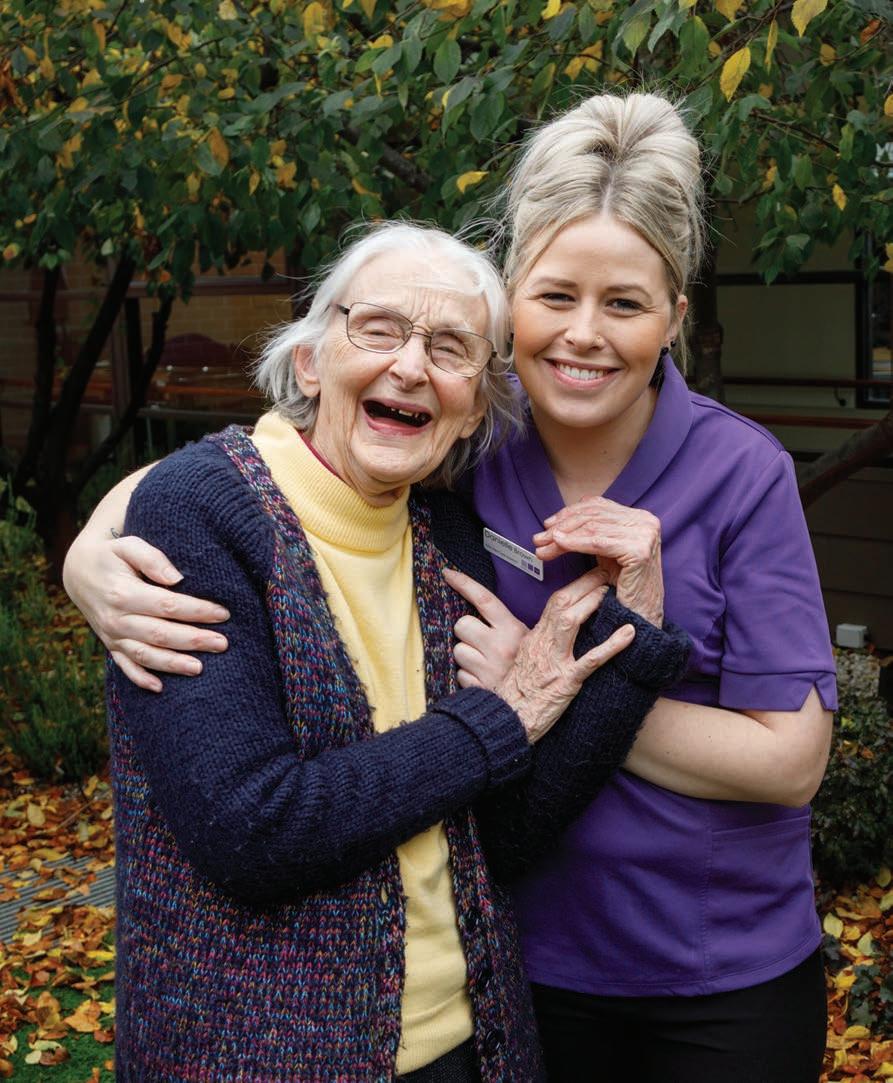
Living well with choice and peace of mind
Care and support tailored just for you with Uniting AgeWell
Help at home
Get assistance with personal and clinical care, household chores, assistive technology and transport
Community support and wellbeing
Remain connected through social group and individual activities, outings, allied health and therapy services, seniors gyms, respite and carer services
Independent living
Maintain an independent lifestyle in one of our vibrant retirement living communities
Residential care
Specialist 24/7 care and support, including dementia and palliative care, within a safe and caring community
With services across Victoria, Uniting AgeWell’s expert, caring teamcan help you find the right services to meet your needs.
unitingagewell.org 1300 783 435
1
2 VICTORIA – WEST 202 4 Aged Care Guide Contents Contents Welcome 3 Steps to accessing aged care 4 Research 6 Preparation 7 Getting assessed 10 Finding providers 12 Managing services 14 Useful phone numbers & websites 15 Checklist 16-17 Definitions of terms 18 Council/ Suburb & Town index 20 In-home care services 21-22 Home Care Packages directory 23-28 Residential aged care homes directory 29-34 Products and services directory 34-35 Definitions of terms 36 Advertisers in this Navigator Guide Opal HealthCare IBC Regis Aged Care Pty Ltd 8-9 Right at Home Australia 11 Tender Loving Cuisine 13 TriCare Ltd OBC Uniting AgeWell IFC-1 Well Placed Care 5
Welcome
Welcome to the first special Navigator edition of the Aged Care Guide to Western Victoria 2024.
This handy mini guide will touch on some of the key steps to accessing care at home or in an aged care facility, as well as a directory of providers delivering a range of aged care products and services in Western Victoria.
A comprehensive list of government-funded services available in Western Victoria is included in this Navigator Guide, providing details of subsidised residential aged care accommodation and approved Home Care Package providers, together with a list of home care providers and products and services available to you.
You can use this Navigator edition in conjunction with our website, AgedCareGuide.com.au , which provides greater detail on homes and services offered. The associated ‘DPS Web ID’ contained in the tables links directly to the relevant provider and the services they offer.
To find out more about our range of home, aged care, retirement and disability resources, visit the website or contact us on 1300 186 688 or by emailing info@dps.com.au.
DPS Publishing Pty Ltd ● 1300 186 688 ● PO Box 1026, Pasadena SA 5042 info@dps.com.au ● AgedCareGuide.com.au ● ABN 53 090 793 730 Advertising Distribution Proudly produced sales@dps.com.au distribution@dps.com.au and printed 1300 186 688 1300 186 688 in Australia
Aged Care Guide
Western Victoria 2024, Navigator Edition
Printed February 2024
Deputy Editor David McManus david.mcmanus@dps.com.au
Chief Executive Officer Michelle Beech
The factual material contained in this publication has been obtained from information supplied by government departments, industry and organisations, by personal interview and by telephone and correspondence. At the time of going to press the publisher believed that all information submitted for publication was accurate and complete. However, the publisher can take no responsibility for inaccuracies or incomplete information that may have been supplied to them in the course of their enquiries detailed above. The facts published indicate the result of those enquiries and no warranty as to their accuracy can be given. The information in this publication is general in nature and does not constitute financial, legal or other professional advice. Readers should consider whether the information is appropriate to their needs and seek professional advice tailored to their personal circumstances. Images within this publication may have been altered from their original format. © Copyright. No part of this publication can be used or reproduced in any format without express permission in writing from The Publisher. ® Aged Care Guide is a registered trademark.
3 VICTORIA – WEST 2024 AgedCareGuide.com.au
Welcome
Steps to accessing aged care
If you need some help to continue living independently in your own home or that it’s time to move into an aged care home, then you may be wondering where to start. We’ve broken the process down into simple steps that will help you get from A to B in your aged care journey.
Steps to accessing aged care
Research
Learn about the different types of care and discover what options are available to you.
Preparation
Get an understanding of what you need to consider and prepare ahead of starting any aged care services.
Getting assessed
An aged care assessment will help decide what level of support you require so you can get the care that best meets your needs.
Finding providers
Find providers to deliver a range of products and services meeting your needs and requirements.
Managing services
Read about managing your supports. For example: when your needs change, your supports no longer suit you or you would like to change providers.
4 VICTORIA – WEST 202 4 Aged Care Guide

W ell P laced c are
Independent & Personalised Aged Care Specialists

Specialised Aged Care Advice and Guidance with Future Planning, Home Care & Residential Care Placement
Our caring and comprehensive service offers:
• A completely independent service (we do not take kickbacks or payments from care providers)
• Assistance with My Aged Care, Services Australia, aged care specific financial advisors and vendor advocates
• Apply for interim home care services, home care package & residential care approvals
• Advocate on your loved ones behalf

• Provide a suitable selection of home care providers, assisted living units & residential aged care facilities
• Book facility tours and guide you through the selection process
• Negotiate accommodation fees & charges to seek your best financial outcome
• A complete end to end service & post placement follow-up
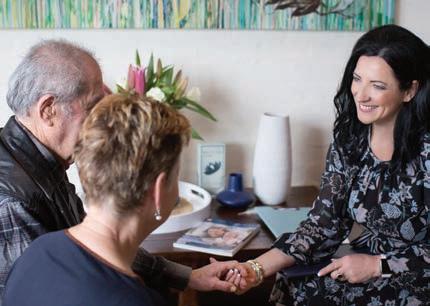 Founding Director Pauline Healy
Founding Director Pauline Healy
Our family centred approach will ease your concerns while we guide your family through all aspects of the Aged Care process. The recommendations we provide are based entirely on your individual circumstances backed by our extensive knowledge of the aged care system and our 10+ years experience in navigating it.
Scan this code to receive more information on future planning your aged care Call today for a friendly chat: (03) 9070 8171 enquiries@wellplacedcare.com.au For more info visit: www.wellplacedcare.com.au 5
Research
Research
Accessing aged care can be complicated and confusing if you have not used support services before or don’t know where to start.
Whether you need support to remain living independently at home or are looking for alternative accommodation, it is important to know what options are available to you. Different types of care include:
Support at home
Different care options that might be available to you include support at home through government-funded programs such as the Commonwealth Home Support Programme (CHSP) or the Home Care Packages (HCP) program.
Home care products and services range from assistance with daily chores and personal care to providing meals, transport assistance and home maintenance. Basic assistance is offered through the CHSP, but if your needs exceed the level of support offered though this program, then a level 1– 4 Home Care Package can offer higher intensity support to help you stay at home.
Private providers can also deliver a range of home support services. They are not government funded and you will need to pay for services out of your own pocket.
Short-term care
There are a few different support options available if you only need support for a short period of time. These options include respite care, which can be delivered in the community or in a residential care home, offering the opportunity for both you and your carer to take a short break.
At the end of a hospital stay, the Transition Care Program provides short-term assistance to help improve your independence and confidence.
If you have not been admitted to hospital, the Short-Term Restorative Care program is a flexible option that focuses on regaining wellbeing over a short period of time.
Residential aged care
Moving into residential aged care can ensure quality of life and comfort if you are no longer able to remain living independently at home. Also known as nursing or aged care homes, these facilities provide 24/7 care as well as a range of other support services and recreational activities. The cost of care in most Australian aged care homes is subsidised by the Australian Government. There is also a number of non-government-funded residential aged care homes, often referred to as ‘supported and assisted living complexes’ and you will need to cover the cost of accommodation and care delivered.
Retirement living
Retirement villages are not nursing homes. They are clusters of villas, units or apartments and you will need a reasonable level of independence to move into a retirement setting. Retirement options are not funded by the government.
Daily care is generally not included, but some providers may offer support services at an additional charge or this can be accessed separately through government-funded home support options.
6 VICTORIA – WEST 202 4 Aged Care Guide
Preparation
There are a few things to organise before being ready for aged care services. Make a list of what support you’re currently getting, what you feel you need help with and key areas that are important to you in a provider that best align with your wishes and interests.
If you’re wanting to access government-funded supports, the first step in starting your aged care journey is to register with My Aged Care. This can be done online or via a phone call to the My Aged Care contact centre on 1800 200 422.
An operator will ask you a number of questions about your personal circumstances and care needs and set up a central client record.
Examples of the questions you may be asked are:
Are you currently receiving aged care services?
Are you getting support from a carer or family member?
Can you prepare your own meals and do housework?
Do you need assistance taking a shower or bath and do you need help getting dressed?
Are there any health concerns or did you have a recent fall?
Do you feel lonely or isolated?
Are there any safety risks in the home?
The aim of this screening is to figure out what needs and support you require and whether you are eligible for an in-person assessment.
Following this conversation, you will be contacted by someone from either the Regional Assessment Service (RAS) or a local Aged Care Assessment Services (ACAS) for an assessment to determine your abilities and what level of care you require.
Here is a list of documents and information you should prepare for the assessment:
Medicare card and a form of identification; for instance, Department of Veterans’ Affairs (DVA) card, driver’s license, passport or healthcare card
Notes or referrals from your doctor
Information about previous home or aged care services you have received
Details about support you receive from family, friends or the community
Questions and information about aged care that you wish to discuss with the assessor, so you have a better understanding of services
The contact details of your doctor and any other health professionals you see regularly
The support of an Auslan interpreter or translator, if required
The attendance of a guardian or caretaker, if needed
Additionally, consider organising your finances and getting advice about how you can pay for any support at home or a place in an aged care facility. It’s also worth making sure you collect medical records, have details about medication handy, have an Advance Care Directive in place and ensure your will is up to date.
7 VICTORIA – WEST 2024 AgedCareGuide.com.au
Preparation
Finding the smile in every day

At Regis, we’re here to keep you connected with the things that matter most to you.
We understand that everyone’s situation is different. That’s why we’re proud to offer a diverse range of care options that are tailored to your needs, including residential aged care, home care, retirement living and day respite.
For the past 30 years, we’ve been dedicated to helping senior Australians find joy and fulfillment in every day.
Enquire today to find out how we can support you or your loved one.
regis.com.au | 1300 998 100 8

VIC Aged Care Homes
Regis Alawarra Lodge
Regis Armadale
Regis Blackburn
Regis Brighton
Regis Cranbourne
VIC Other Services
Regis Home Care
Eastern Metro
Regis Home Care
Mildura
Regis Dandenong North
Regis East Malvern
Regis Fawkner
Regis Frankston
Regis Inala Lodge
Regis Macleod
Regis Ontario
Regis Ringwood
Regis Rosebud
Regis Sandringham
Regis Shenley Manor
Regis Sunraysia
Regis Day Therapy Centre
Inala Village
Regis Day Respite
Inala Village
SCAN TO LEARN MORE ABOUT REGIS
To find out more about our aged care communities in VIC, call us on 1300 998 100 or visit
9
regis.com.au
Getting assessed
Getting
assessed
The aged care assessment will help decide what level of support you require. Your assessor will best be able to help you if you provide lots of information about yourself and what day-to-day tasks you struggle with.
The assessment will be done by a social worker, nurse, doctor or other health professional and can take an hour or so.
If the My Aged Care contact centre believes that you are eligible for basic home support you will be assessed by a professional from the Regional Assessment Service (RAS).
If you require higher care support, a member of the Aged Care Assessment Services (ACAS) will visit you at home to assess you for a higher level of support at home to meet your needs or a place in a residential care home.
The assessor will ask you a number of questions about any supports you receive, your current lifestyle, any health concerns or chronic illnesses, how you deal with tasks at home, if you’re struggling with any cognitive issues or memory loss, whether you have problems at home or with personal safety and any activities you engage in with family or in the community.
Topics that might be covered or that you may want to bring up during your assessment include: your medical history; your living arrangements; your support network; current services and supports you are receiving; your cognitive and behavioural functioning; how you deal with daily tasks around the home; any health and lifestyle concerns you have.
Be open and transparent about your wishes and what you believe will be of assistance around the home. They might also ask you for your permission to talk with your doctor or specialist about the impact of any health conditions on your day-to-day life.
The assessment is also an opportunity for you to ask questions. If you don’t understand something, make sure you clarify with your assessor. You shouldn’t be leaving your assessment feeling confused or stressed.
Consider asking questions, such as:
What are my rights and responsibilities during this assessment process? What services are available in my area?
Are there support options available for my carer? What financial assistance am I eligible to receive? Are there culturally appropriate services in the area? Who can I contact if I have any questions after the assessment?
Following your assessment, you will receive a letter from the government letting you know if you have been approved for aged care services and what supports are funded.
10 VICTORIA – WEST 202 4 Aged Care Guide

Right at Home are leaders in quality homecare and support, delivering services that allow our clients to remain safe and independent in their own home. Your local Right at Home family in Southwest Victoria is ready to look after yours when you can’t.
• 24/7 On Call & 24/7 Care Service
• Supervised, Individual Care Plan
• Approved Home Care Package Provider Levels 1-4
• No Home Care Package Management Fees
• Complex Nursing Care
Disability & NDIS Support • Flexible, Reliable, Certified Carers • Post-Operative Care • Hospital In The Home • Personal & Companion Care • Domestic, Shopping, Transport
11
•
SWITCH TO BETTER QUALITY HOMECARE CHOOSE RIGHT AT HOME
™ The
at Home™ 1300 363 802 www.rightathome.com.au
Let’s start talking about living
Right Care, Right
Finding providers
Finding providers
Once you have been assessed and approved for government-funded aged care, either for services in your own home or a place in an aged care home, you can start the process of finding a provider that suits your needs.
Your letter from My Aged Care, confirming you are ready to start accessing services, will include a referral code linked to the type of service you are eligible to access. If you need the support of multiple services, you will be given multiple referral codes, one for each service.
The service provider or aged care home of your choice will need this referral code to access your information with My Aged Care and manage the referral. They’ll also be able to access the funding allocated to you.
Choosing which provider to trust with providing support is an important and personal decision – one that you want to think carefully about and shouldn’t rush.
You may want to start by writing down what you are looking for in a provider and what is important to you. Are low fees important to you or would you like a provider who can support your cultural needs? If accessing home care, do you want the same support worker to assist you each time and do you want to receive support on specific days or are you more flexible with time?
It’s a good idea to discuss your wishes and options with your family and support network, as they may be able to help you research, provide independent opinions on providers or share personal experiences.
It’s useful to create a shortlist of providers in your local area to narrow down your search.
When considering a potential provider:
Look at the provider’s website, social media pages and online reviews
Check out their credentials, such as quality certifications and industry awards
Do they have any past or present sanctions or notices of non-compliance?
Ask them directly or check the government’s non-compliance finder tool at myagedcare.gov.au/non-compliance-checker
Use this Navigator Guide or the AgedCareGuide.com.au directory to search for service providers in your area that meet your requirements
If you aren’t comfortable finding or choosing a provider by yourself, then there are experts who can help you find a nursing home that suits your needs and preferences. A placement consultant has knowledge of local aged care facilities and can make the process of entering aged care smoother. Find a placement consultant on AgedCareGuide.com.au or call 1300 903 627 to access placement services.
Once you have chosen a provider, you will need to contact them to start the home care services you need or to be placed on their waiting list for a bed vacancy. During this conversation, it is also essential to discuss fees and services with your new provider so you know how much the support or aged care bed is going to cost.
12 VICTORIA – WEST 202 4 Aged Care Guide
For over 28 years Tender Loving Cuisine has been serving the community with care, compassion and respect. Australian Made and Owned, our health accredited, home delivered meals cater for dietary requirements with all meals developed and supported by independent review.
Our extensive menu with over 100 items to choose from includes selections that are Dairy Free, Low Salt, Gluten Free, Heart and Diabetes Friendly.
Our purpose is to assist clients to maintain their dignity and independence. Assured nutrition, great taste, strict dietary controls and dedicated customer service is at the heart of what we do.
With a trusted reputation and Industry Recognition, Tender Loving Cuisine sets the standard in quality and reliability. We proudly provide meals in Aged Care Packages, NDIS, CHSP and the general community in areas of QLD, NSW, ACT and VIC.
TLC Meals deliver to over 3,200 suburbs across NSW, ACT, VIC and QLD

Our purpose is to assist clients to maintain their independent lifestyle. Good nutrition, great taste, dietary controls and dedicated customer service is at the heart of what we do.
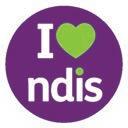
13 Call 1800 801 200 Registered Provider of Delivered Meals NDIS, HCP, CHSP | NSW Food Authority Licence 24521 | HACCP Certified TLC Meals setting the standard in quality home delivered meals. You’ll love the homemade taste or email clientservices@tlcmeals.com.au
♦ Quality ♦ Taste ♦ Nutrition ♦ Reliability ♦ Service
Managing services
Managing services
Throughout your aged care journey, there may come a time where you need to make changes to the services you are receiving.
This may be because you’re going on a holiday or need to go into hospital and don’t need any services to be delivered while you’re away. Perhaps your needs have changed and your current supports no longer suit you. Alternatively, you may like to change providers, either because you’re moving to a different area or because you’re not entirely happy with your current provider.
The process of making changes to your current services depends on the type of support you are receiving. However, the first step should be to talk with your current provider.
Service providers have an ongoing responsibility to make sure you receive quality care and to respect your rights and preferences. They should monitor the services they provide under your care plan to ensure your needs and goals are being met. If there are significant changes in your care needs they can help you through the process of reviewing your supports.
Reviewing your needs and supports may mean that you need to have another aged care assessment. For example: if you were originally assessed as having low-level care needs but your mobility has decreased over time and you would like to access higher level supports.
You can request a reassessment by your local ACAS to determine if you’re eligible for higher level care. You must be reassessed to move on from CHSP supports and between different levels of Home Care Packages.
Depending on the services you’re already receiving you may need to consider other options, such as:
Reviewing your care plan to identify alternative support options and priorities, such as replacing informal supports with formal supports or considering additional support services – e.g. support on weekends
Purchasing additional private services
Utilising residential care, either as short-term respite to complement your package or as a long-term option
If your current provider can’t offer the services or changes you want, you can switch to a different provider that can meet your needs.
When choosing a new provider: research and ensure they can meet your needs; contact My Aged Care to get a new referral code to give to your new provider and agree on a date to switch your services; notify your current provider, in writing, to let them know you will be terminating your services with them and from what date.
Be mindful that your current provider may charge an exit fee to cover any administrative costs. Exit fees may vary between providers and the amount should be clearly indicated in your care agreement.
14 VICTORIA – WEST 202 4 Aged Care Guide
Useful phone numbers and websites
Advocacy
CarerHelp carerhelp.com.au
Carers Australia
02 6122 9900 carersaustralia.com.au
Carers Victoria
1800 514 845 carersvictoria.org.au
COTA Information Service
1300 135 090 cotavic.org.au
COTA Victoria
03 9655 2100 cotavic.org.au
Elder Rights Advocacy
1800 700 600 era.asn.au
National Seniors
1300 765 050 nationalseniors.com.au
Older Person’s Advocacy Network (OPAN)
1800 700 600 opan.org.au
Seniors Rights Victoria
1300 368 821 seniorsrights.org.au
Cultural
Centre for Cultural Diversity in Ageing (PICAC)
03 8823 7979 culturaldiversity.com.au
Ethnic Communities Council of Victoria
03 9354 9555 eccv.org.au
Federation of Ethnic Communities’ Council of Australia
02 6282 5755 fecca.org.au
Translating and Interpreting Service
13 14 50 tisnational.gov.au
Government
Aged Care Quality & Safety Commission
1800 951 822 agedcarequality.gov.au
Department of Veterans’ Affairs
1800 838 372 dva.gov.au
My Aged Care
1800 200 422 myagedcare.gov.au
Service Victoria service.vic.gov.au
Services Australia - Aged Care Line
1800 227 475 servicesaustralia.gov.au/ageing
Services Australia - Carers & Disability
13 27 17 servicesaustralia.gov.au/carers
Services Australia - Medicare
13 20 11 servicesaustralia.gov.au/medicare
Services Australia - Older Australians
13 23 00 servicesaustralia.gov.au/ageing
Health
Dementia Australia
1800 100 500 dementia.org.au
Dementia Behaviour Management Advisory Services (DBMAS)
1800 699 799 dementia.com.au
Dementia Support Australia (DSA)
1800 699 799 dementia.com.au
National Continence Helpline
1800 330 066 continence.org.au
National Dementia Helpline
1800 100 500 dementia.org.au
Seniors Health Card
13 23 00 servicesaustralia.gov.au/ individuals/services/centrelink/ commonwealth-seniors-health-card
Legal
Consumer Affairs Victoria
1300 558 181 consumer.vic.gov.au
Office of the Public Advocate
1300 309 337 publicadvocate.vic.gov.au
State Trustees VIC
1300 138 672 statetrustees.com.au
Victoria Legal Aid
1300 792 387 legalaid.vic.gov.au
Victorian Civil and Administrative Tribunal (VCAT)
1300 018 228 vcat.vic.gov.au
Other
Carer Gateway
1800 422 737 carergateway.gov.au
Communication and Assistive Technology (ComTEC) (ILU Victoria) 03 9633 6945 yooralla.com.au/services/ communication-and-assistive-technology/ comtec
National Relay Service
1800 555 660 infrastructure.gov.au
Open Arms - Veterans &
Families Counselling 1800 011 046 openarms.gov.au
Relationships Australia
1300 364 277 relationships.org.au
Residents of Retirement Villages Victoria 03 9015 8402 rrvv.org.au
Seniors Card (VIC)
1300 797 210 seniorsonline.vic.gov.au
SWEP (Statewide Equipment Program)
1300 747 937 swep.bhs.org.au
Volunteering Victoria 03 9052 4524 volunteeringvictoria.org.au
15 VICTORIA – WEST 2024 AgedCareGuide.com.au Useful phone numbers and websites
Checklist
Checklist
From getting assessed and finding a provider to filling out forms and calculating fees, there is a lot to organise before starting any type of aged care services. To help you with this process, we’ve created a checklist with important things to remember.
Assessment
Contact My Aged Care on 1800 200 422 or apply online at MyAgedCare.gov.au
Organise a face-to-face assessment with an ACAS
Gather medical information for the assessment
Have your assessment
Receive successful application letter
Start preparing to access aged care services at home or for a move into aged care
Financial
Referral for government-funded aged care
Assess what you can afford for fees and costs in aged care, including basic daily fee, means-tested care fee, accommodation fee and fees for extra or additional services. Use the AgedCareGuide.com.au fee estimator to help you
Contact Centrelink if you require financial assistance
Fill out the application for the income and asset test
Arrange a financial assessment through Services Australia, contact 1800 277 475
Determine your home plan; are you selling, keeping, or renting out your family home?
Do you require a reverse mortgage to help pay for aged care?
Optionally, you can engage a financial planner or advisor
Important documents
Update your will
Create an Advance Care Directive
Create an enduring power of attorney
Create an enduring guardian
Notify your executors, administrators and attorneys
Update your family and friends about your wishes and goals
Access and prepare your full medical history
Compile the contact details of important people, like family or medical specialists
Create a list of your personal preferences, i.e. religion, culture, allergies, etc
Optionally, you can appoint a nominee to deal with the government and Centrelink on your behalf
16 VICTORIA – WEST 202 4 Aged Care Guide
Searching for aged care
Use the AgedCareGuide.com.au to find service providers and aged care facilities near you
Make a list of things that are important to you to have in an aged care facility
Utilise the Compare Provider tool on AgedCareGuide.com.au
Send an enquiry to a facility by using the form at the bottom of AgedCareGuide.com.au nursing home profiles
Make a short list of aged care facilities you like
Visit the facilities you are interested in for a tour or meet with service providers
Ask as many questions as possible of the facilities or providers you are considering to get a good understanding of their services and applicable fees
Compile notes of facilities you have visited
Optionally, you can organise residential respite to trial a potential facility
Optionally, you can enlist a placement consultant to assist with finding a facility
Applying to aged care
Fill in an application form for a home
Have your name on the waiting list for a facility
Apply to multiple facilities
Accept an offer from an aged care home
Confirm placement in an aged care facility
Provide important documents regarding your financial situation
Negotiate care and accommodation with your provider – you can have someone negotiate on your behalf
Seek legal advice before signing any documentation from the facility
Enter into an agreement with your aged care home: resident agreement, accommodation agreement or, optionally, an extra services agreement
Have a care plan put together
When moving, notify: Centrelink or Department of Veterans’ Affairs; Australian Taxation Office; Medicare; doctors, specialists and pharmacist; Australian Electoral Commission; local council and post office; current support at home providers family, friends and neighbours; health insurance, superannuation and bank; utilities, i.e. phone, gas, electricity and water.
Confirm what furniture and personal items you are able to bring to your new home
17 VICTORIA – WEST 2024 AgedCareGuide.com.au
Checklist
Definitions of terms
Definitions of terms
Accommodation payment – An amount payable on entry to an aged care home. Payment amounts can vary between aged care homes and are set depending on the accommodation type and features of the home.
Aged Care Assessment Services (ACAS) – Assess and approve older people for Australian government-subsidised aged care services.
Assessment – A face-to-face assessment with a member of an ACAS to review whether someone is eligible to enter a government-funded aged care home.
ATSI – Aboriginal and Torres Strait Islander. Used to indicate services cater for ATSI people.
CALD – Cultural and linguistically diverse. Used to indicate services cater for people of different backgrounds.
Care plan – Developed by the service providing your care and outlines care needs and instructions on how these needs will be met.
Carer Gateway – This online resource and helpline provides support by linking carers to information, counselling, respite and other services.
CHSP funded – An in-home or centre-based care service funded by the Commonwealth Home Support Programme government initiative.
Consumer-directed care (CDC) – Allows you to control the types of care you access, how it is delivered and who provides that care. All Home Care Packages are delivered on a CDC basis.
Daily accommodation payment (DAP) – This is a daily payment to a government-funded aged care facility, paid periodically, i.e. monthly. This is not a refundable payment.
Daily fee – A daily charge, in addition to the accommodation payment, payable by all residents. It contributes towards daily living expenses, like meals, cleaning, laundry and assistance with daily living.
Department of Veterans’ Affairs (DVA) – Supports older Australians who served Australia and their widow/widowers and families.
Income and means test – Calculates how much you will need to pay your aged care provider based on your current income and assets.
My Aged Care – Australian Government aged care services portal and contact centre. NESB – Non-English speaking background. Used to indicate services cater for people who speak other languages.
Placement consultant – A professional who assists clients in finding an aged care home that fits their needs and wishes.
RAD/DAP combination – This includes both partial lump sum and daily payments for aged care accommodation.
Referral code – If approved for government-funded aged care, you will receive a confirmation letter with your referral code, which needs to be provided to your chosen aged care facility.
Refundable accommodation deposit (RAD) – This is paid as a lump sum when entering a government-funded aged care facility and refunded, minus agreed deductions, when leaving the facility.
Regional Assessment Service (RAS) – In-home assessments of new and existing clients/ carers for CHSP services.
Respite care – Services provided so a client or their carer can take a break from their daily routine.
Supported and assisted living (SL) – Supported and assisted living communities offer accommodation and care to residents on a fee-for-service basis without government funding.
Supported residential services (SRS) – Privately run aged care facility that provides similar accommodation and care to that of a government-funded facility but without the funding support.
18 VICTORIA – WEST 202 4 Aged Care Guide

19
Council (LGA) reference index
The tables below provide you with an alphabetical list of LGAs and the page reference where you can find details about aged care homes and Home Care Packages in that local government area (commonly referred to as a council district).
Bay
Suburb & town reference index
A list of suburbs and the page references where all the aged care homes in that suburb are listed. If a suburb/town is not listed please refer to the next closest suburb.

Aged Car e Guide 20 VICTORIA – WEST 202 4 Suburb / Town Page Altona Meadows 30 Altona North 30 Ardeer 30 Ascot Vale 32 Avondale Heights 32 Broadmeadows 31 Brunswick 33 Brunswick East 33 Brunswick West 33 Burnside 32 Cairnlea 30 Coburg 33 Coburg North 33 Suburb / Town Page Coolaroo 31 Craigieburn 31 Delahey 30 Essendon 32 Essendon North 32 Fawkner 31 Fitzroy North 33 Flemington 32 Footscray 31 Gladstone Park 31 Glenroy 33 Greenvale 31 Hoppers Crossing 33 Suburb / Town Page Jacana 31 Keilor Downs 30 Keilor East 32 Kingsville 31 Maidstone 32 Meadow Heights 31 Melton 32 Moonee Ponds 32 Newport 31 Pascoe Vale 33 Pascoe Vale South 33 Point Cook 33 St Albans 30 Suburb / Town Page Sunbury 31 Sunshine 30 Sunshine North 30 Sunshine West 30 Sydenham 30 Tarneit 33 Werribee 34 Westmeadows 31 Williams Landing 34 Williamstown 31 Wyndham Vale 34
Council District Page Reference ResidentialHome Care
3023-28 Hobsons
30-3123-28 Hume
Council District Page Reference ResidentialHome Care Maribyrnong 31-3223-28 Melbourne 23-28 Melton
Council District Page Reference ResidentialHome Care Moonee
Moreland
Wyndham
Brimbank
3123-28
3223-28
Valley 3223-28
3323-28
33-3423-28
In-home care services
See Definition of Terms page 18
AgedCar eGuide.com.au VICTORIA – WEST 2024 21 Definition of terms see page 18
Notes Advert Page DPS Web ID PHONE (03) CHSPFunded Services PrivatelyFundedServicesDVAServicesVHCServicesDementiaCareDomesticProfessionalsHealthServicesHomeMaintenance/Gardening Meals&/orShoppingMedicationSupervisionPalliativeCarePersonalCarePharmaceuticalDeliveryRespiteCareSocial&/orRecreational Transport 365 Wellbeing Allied Health 9899 9933 9 64126 Accent Home Care 8720 1338 99999999999 21355 AccessCare 1300 819 200 9999999999999 Pet care, Emergency after hours service 17601 Active Community Group 8820 0000 999999999999999 61989 AMCS Home Care Services 9689 9170 99999999999 CALD 20697 Australian Unity Home Care Services 1300 160 170 999999999999999 41062 Ballan Health and Care Services 5366 7999 9 17635 Baptcare Coasthaven Community 13 22 78 9 21847 Baptcare Nursing & Allied Health 13 22 78 99999 20595 BASScare Home Care 8809 0050 999999999 62221 BASScare Meals on Wheels 9880 4703 99 9 Note 1 38767 BASScare Social Support Services 9880 4709 9 99 20282 Benetas Home Care East 1300 236 382 999999999999 24 hour care available 17577 Benetas Home Care Gippsland 1300 236 382 9999999999999 24 hour care available 17720 Benetas Home Care North West 1300 236 382 999999999999 24 hour care available 17608 Benetas Home Care Rural North West 1300 236 382 9999999999999 24 hour care available 17718 Benetas Home Care South 1300 236 382 999999999999 24 hour care available 17703 BodeWell Community Care VIC Privately Funded Services 1300 726 291 999999999 17897 Brotherhood of St. Laurence Home Care Packages 1300 147 147 99999999999 Includes overnight respite 17584 Calvary Home Care - Gippsland 1800 527 272 999999999999999 18125 Calvary Home Care - Metro Melbourne 1800 527 272 99999999999999 16056 Calvary Home Maint & Modifications 1300 660 022 9 9 37128 CO.AS.IT. Home Care Services (VIC) 9349 9000 99999999 21739 Healthy Ageing Place Mornington (and home care office) 5978 9700 9999999999999 38880 HenderCare (VIC) 1300 764 433 999999999999999 Note 2 21741 HomeMade Support 1300 655 688 9999999999999 62750 Just Better Care VIC 1300 587 823 99999999999 19815 Mable 1300 736 573 9999999999999 22109 Magical Care Home Care Services 9701 8828 99999999999 63558 mecwacare - Home Care Services South West Region (includes Ballarat) 5333 0900 999999999999999 20869 mecwacare - Home Nursing & Care Services Barwon Region 5271 4888 999999999999 63138 mecwacare Home Care Services Ballan 8573 4980 999999999999999 22257 mecwacare Home Care Services Gippsland Region (includes Bass Coast) 8573 4980 999999999999999 38874 mecwacare Home Care Services North West Metro (includes Melbourne) 8573 4980 9999999999999999 19964 mecwacare Home Care Services South East Metro 8573 4980 9999999999999999 21526 mecwacare Home Care Services South East Region 5841 5454 9999999999999999 17918 mecwacare Home Nursing & Care Services Mornington 5981 7888 99999999999999 63139 Mercy Health Home Care Ballarat 4372 9800 999999999999999 17641 Mercy Health Home Care Colac 5233 5603 999999999999999 20606 Mercy Health Home Care Geelong 5240 7300 99999999999999 61708 Note: 1. Meals on Wheels only, shopping excluded 2. Includes services for clients with mental health issues
In-home care services
Aged Car e Guide VICTORIA – WEST 202 4 Definition of terms see page 18 22 Mercy Health Home Care Gippsland 5142 9299 999999999999999 17640 Mercy Health Home Care Hughesdale 9557 0811 999999999999999 18510 Mercy Health Home Care Lynbrook 9797 3900 999999999999999 Includes Dementia Advisory Service 17604 Mercy Health Home Care Parkville 9385 9444 999999999999999 18984 Mercy Health Home Care Reservoir 8414 6050 999999999999999 17590 Mercy Health Home Care Shepparton 5831 2960 999999999999999 19963 Omni-Care 9484 8102 9999999999 16036 Parkglen Home Care Services 1300 117 147 9999999999999 21697 Pearl Home Care 8731 1696 99999999999999 63886 Plena Healthcare 13 60 33 9 37938 Regis Home Care Eastern Metro 1300 188 740 9999999999999 8-9 21584 Right at Home RightCare 07 3054 1360 9999999999999 11 22069 Right at Home Southwest Victoria 4510 8919 999999999999 11 63492 Salvos Home Care VIC 1300 111 227 999999999999 Note 1 17671 Simply Helping Bayside Peninsula 9574 0924 99999999999 Note 2 21876 Simply Helping Central and Northern Melbourne 9661 0499 9999999999 62773 Simply Helping Central Highlands & Djerriwarrh 5341 8046 99999999999 Note 2 21880 Simply Helping Geelong & Barwon 5261 4808 99999999999 Note 2 21881 Simply Helping Gippsland South & West 9799 4676 9999999999 Note 2 21882 Simply Helping Goulburn Valley 5795 1635 99999999999 Note 2 21883 Simply Helping Greater Eastern Melbourne 0448 225 177 999999999 Note 2 21877 Simply Helping Inner & South Eastern Melbourne 9574 0924 99999999999 Note 2 21878 Simply Helping Loddon Mallee 5486 0203 9999999999 Note 2 20278 Simply Helping North East Melbourne 9001 8585 99999999999 Note 2 21879 Simply Helping Outer South Eastern Melbourne 0406 316 334 99999999999 62774 Simply Helping South West (VIC) 5381 2076 99999999999 Note 2 21884 St Vincent's Care - Home Care Melbourne 1800 778 767 999999999999 21964 Star Residential Care 9763 8009 99999999 61573 Uniting AgeWell Andrew Kerr Home Care 5975 6334 9999999 IFC-1 62242 Uniting AgeWell Bendigo Respite Services 5454 2100 9 99 IFC-1 61761 Uniting AgeWell Grampians Community Transport 5326 0701 9 9 IFC-1 63573 Uniting AgeWell Hume Home Care 8527 5880 9999999 IFC-1 63283 Uniting AgeWell Respite and Carer Support, Victoria 1300 783 435 9 99 IFC-1 21522 Uniting AgeWell Short-Term Restorative Care (VIC) 9658 5609 99999 STRC IFC-1 62239 VMCH Ballarat 1300 698 624 9999999999999 64079 VMCH Echuca 1300 698 624 9999999999999 64083 VMCH Moe 1300 698 624 9999999999999 64078 VMCH Private Home Care Services 1300 698 624 999999999 Overnight services available 20859 VMCH Shepparton 1300 698 624 9999999999999 64080 VMCH Wangaratta 1300 698 624 9999999999999 64081 VMCH Wantirna 1300 698 624 9999999999999 64082 Woman's Way Cleaning Services Pty Ltd 0413 092 769 99 60383
See Definition of Terms page 18 Notes Advert Page DPS Web ID PHONE (03) CHSPFunded Services PrivatelyFundedServicesDVAServicesVHCServicesDementiaCareDomesticProfessionalsHealthServicesHomeMaintenance/Gardening Meals&/orShoppingMedicationSupervisionPalliativeCarePersonalCarePharmaceuticalDeliveryRespiteCareSocial&/orRecreational Transport Note: 1. Includes access to mobility equipment & assistive technology 2. Includes services for clients living with dementia/disabilities; post hospital support IFC Inside Front Cover
Home Care Packages directory –approved providers
Approved Home Care Package providers deliver home care and support services to members of the community who live at home.
If you’ve been approved for a government-funded Home Care Package of any type, you may approach any approved Home Care Package provider to deliver the services you need.
Some providers may only provide services in one region while others can service multiple areas.
On the following pages you’ll find alphabetised lists of approved providers, in Melbourne city and Western metro.
To help you know which approved providers offer services in a certain region, we’ve included coloured bars down the left hand side of the directory pages.
The reference tables for Metropolitan Melbourne are organised in two regions: Melbourne city and Western metro.
The list below is a quick reference guide to help you find in which group council districts are listed. For example: Moreland LGA is grouped under Western metro.
Metropolitan Melbourne regions
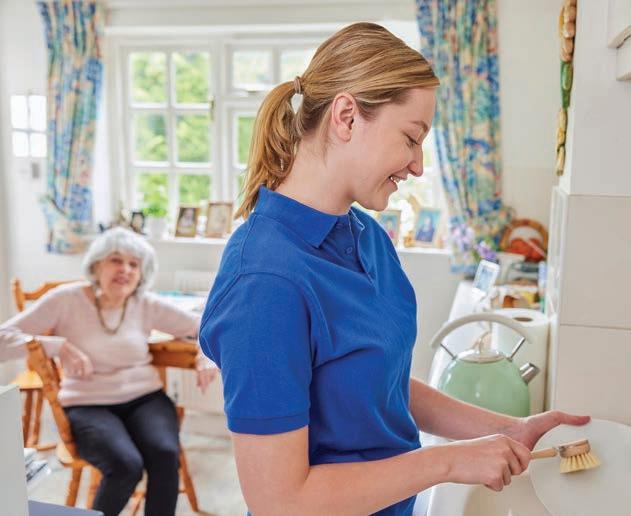
O M E C A R E P A C K A G E S
AgedCar eGuide.com.au VICTORIA – WEST 2024 Council District Region
Western Hobsons
Western Hume Western Maribyrnong Western Melbourne Melbourne Council District Region Melton Western Moonee Valley Western Moreland Western Wyndham Western
Brimbank
Bay
HCPs metropolitan & Western
23
H
How to read the HCP table
The table on the next few pages lists Home Care Packages approved providers in alphabetical order, detailing the Home Care Packages level they offer and if they offer any package supplements.
Ethnicity, country or cultural groups listed under ‘Notes’ apply to all package levels in that row. If service providers have an advertisement in this Guide, then the page number of the advert is listed in red under ‘Advert Page’. The ‘DPS Web ID’ number can be used as a unique identifier to find out more information on AgedCareGuide.com.au.
The same type of care and services are provided under each Home Care Package level of care, and these may include transport, domestic assistance, social support, personal care, home maintenance, home modification, nursing care, food services and medication assistance. The hours of care are increased at each level of care. i.e. more hours of care and services are provided under Home Care Package Level 4 and the least under Home Care Package Level 1. Package supplements, like the Dementia Supplement Z� and the Veterans’ Supplement R, are offered to eligible persons only.
Some packages are specifically for people who are financially or socially disadvantaged e, people with housing needs or at risk of homelessness Y or for people who live in rural, remote or isolated areas t. The cultural environment g indicates providers offering services for people from culturally diverse backgrounds.
Based on your care needs, an ACAS assessment will determine what level of care you are eligible for and if any supplements apply to you.
These icons help you find the packages that are most suitable for you.
Aged Car e Guide 24 VICTORIA – WEST 202 4 Definition of terms see page 18
n Aboriginal Community Elders Services 9383 4244 1234 8Zetg Note 1 16498 n n Absolute Care & Health 9070 9931 1234 8Ze 21831 n n Accent Home Care 8720 1338 1234 8ZeRg Note 2 21355 n n ACCS North & West 1800 953 963 1234 8Zg Note 3 17683 n n Active Community Group 8820 0000 1234 8ZeYRg Note 4 61989 n n Age Up Health 1300 254 326 1234 8ZeR 61667
e Packages for people who are financially or socially disadvantaged Y Packages for people with housing needs and at risk of homelessness t Packages for people who live in rural, remote or isolated areas R Packages for veterans Z Packages for people with dementia 8 General packages suitable for all eligible clients g Cultural environment Melbourne city Western metro A – Z list of all approved providers who are eligible to deliver Home Care Packages in Greater Melbourne Metropolitan SERVICE PROVIDER PHONE (03) Home Care Packages Levels Home Care Packages Supplement Notes Advert Page DPS Web ID Note: 1. ATSI - Koori Community Aged Care Packages services available 3. Bosnian, Croatian, Macedonian, Slavic 2. Arabic, CALD, Eastern, Northern, Southern & Western European, Indian, LGBTIQ, NESB 4. Arabic, Asian, CALD, Chinese, German, Indo-Chinese, Malaysian, Singaporean, South Asian, Vietnamese
n
n
n
n
n
n
n
n
n
n
n
AgedCar eGuide.com.au VICTORIA – WEST 2024 25 Definition of terms see page 18
annecto
Home Support Northern Region
1800 266 328 1234 8ZeYtRg ATSI, CALD, LGBTIQ 17652
Support
Region
1800 266 328 1234 8ZeYtRg ATSI, CALD, LGBTIQ 19909
n
at
(VIC)
n n annecto at Home
Western
(VIC)
n At Home Services Feros Care Western Metro (VIC) 1300 763 583 1234 8g Priority to LGBTIQ clients 21151
n At Your Service Home Care 1300 952 860 1234 8ZeYRg Note 1 38565
Care
1300 433 983 1234 8Zeg Note 2 38603
n n Auspire
VIC
Australian
9689 9170 1234 8ZeRg CALD 20697
n n
Multicultural Community Services (AMCS)
Australian Vietnamese Women's Association - Baybrook 9428 9078 1234 8Ze 61239
n
n AVWA Home Care Services East & South 9546 2699 1234 8Zg Vietnamese 38615
AVWA Planned Activity Groups North and Home Care Packages North-East-South 9428 9078 1234 8Zg Vietnamese 18976
n
9396 1922 1234 8Zg Vietnamese 17705
BallyCara HomeCare VIC 1300 037 542 1234 8g Italian 38771 n Baptcare Home Help Northern Metro 13 22 78 1234 8ZeYRg Maltese 17583
n Baptcare Home Help Western Metro 13 22 78 1234 8ZetRg Maltese 17716
n n AVWA Planned Activity Groups West and Home Care Packages West
n
n
n Benetas Home Care North West 1300 236 382 1234 8ZeYRg Note 3 17608
n Better Living Home Care Packages
1300 307 344
8ZeYRg Note 4 19001
BlueCross Community Services 1300 133 414 1234 8ZeRg CALD 17642 n BodeWell Community Care Packages North Melbourne Region 1300 726 291 1234 8ZeR 38177 n BodeWell Community Care Packages West Melbourne Region 1300 726 291 1234 8ZeR 19265
n Bolton Clarke, At Home Support 1300 221 122 1234 8Ze 17935
(VIC)
1234
n n
n
n Brotherhood of St. Laurence Home Care Packages 1300 147 147 1234 8ZeYR 17584
n Calvary Home Care - Metro Melbourne 1800 527 272 1234 8ZetR 16056
Care Connect VIC 1800 692 464 1234 8ZeYtRg Note 4 17609
n Care Services Australia 1300 455 322 1234 8Z 38987
n Chinese Community Social Services Centre (CCSSCI) Home Care Packages 8848 0288 1234 8Zeg Chinese 17578
n Claro Aged Care & Disability Services 1300 303 770
ZeYtRg CALD 22122
n
n n
n
n
n
1234
Care Packages
9349 9000
8Zeg Italian 17661
n CO.AS.IT. Aged
(VIC)
1234
Care 8548
20268
n n Colbrow
5453 1234 8ZeR
n Comfort Home Care 02 7258
8Zt 38406
7211 1234
n Comm Care 9803
8ZeYtRg Asian, European 38435
3504 1234
Care Australia
Ltd 1800
63349
n Empower Homecare (EPHC) 9942 7106 1234 8Z 22297
n Enrich Living Services VIC 1300 202 003 1234 8ZeR 17674 n n Farris Care Services 1800 572 401 1234 8 46449 n FCCVI Home & Community Care 9687 9011 1234 8g Asian, CALD, Filipino 18997 n Feros Care/ At-home aged care in Victoria 1300 418 418 1234 8eR 20734
n Five Good Friends Home Care Services VIC 1300 787 581 1234 8Z 22263 n n Five Good Friends NDIS Services 1300 787 581 1234 8Z 49179 n n Fronditha Care Home Care Packages 9552 4100 1234 8ZeYtRg CALD, Greek, NESB 17596 n n genU Home Care Packages (VIC) 1300 558 368 1234 8ZeYtRg ATSI, CALD, LGBTIQ 19528 n n Great Service Home Care 1300 122 020 1234 8 64024 n n Guardian Healthcare Services 1300 978 009 1234 8Z 61583 n n Guardian Network Home Care Services VIC 1300 932 273 1234 8Z 20711 n n Guardian Network Home Maintenance Services 1300 932 273 1234 8 38046 Note: 1. CALD, European, South Asian 3. ATSI, CALD, LGBTIQ, NESB 2. African, CALD, European, Islamic, Muslim, NESB, Slavic, Sri Lankan; Oxygen Supplement 4. CALD, Chinese, European, German, Italian Melbourne city Western metro A – Z list of all approved providers who are eligible to deliver Home Care Packages in Greater Melbourne Metropolitan SERVICE PROVIDER PHONE (03) Home Care Packages Levels Home Care Packages Supplement Notes Advert Page DPS Web ID
n n Continuity
Pty
012 273 1234 8ZeYtR
n
n
n
General
Packages
Packages for people who
Packages
Packages
Packages
Aged Car e Guide 26 VICTORIA – WEST 202 4 Definition of terms see page 18 e
are financially
socially disadvantaged Y
or
for
with housing needs
risk of homelessness t
people
and at
for
who live
rural, remote
isolated areas R
people
in
or
veterans Z
for
for
with dementia 8
people
packages suitable for all eligible clients g Cultural environment n n Guardian Network Nursing/Palliative Care 1300 932 273 1234 8 38047 n n Guardian Network Nursing/Support Services 1300 932 273 1234 8 38048 n n Happy Living Home Care Packages 1300 911 728 1234 8ZetR 62822 n n HCA Home VIC 1300 422 111 1234 8ZetR 38171 n healthAbility Home Care Packages 9430 9100 1234 8ZetR 19011 n n HenderCare (VIC) 1300 764 433 1234 8ZeR 21741
n Home Caring 1300 875 377 1234 8Zeg Note 1 39049 n Home Instead Melbourne Inner South & Bayside 9576 8545 1234 8 20870 n n Home Instead Senior Care Footscray 9317 5204 1234 8Z 49351 n n Home Physio Melbourne 1800 166 167 1234 8 46601 n n Home Support Services (VIC) 1800 854 300 1234 8ZetR 21928 n Hume City Council Aged Care Services 9205 2200 1234 8Z 17668 n integratedliving Australia Victoria 1300 782 896 1234 8ZetR 21237 n IPC Health Aged Care Services 9296 1200 1234 8ZeRg ATSI, CALD, LGBTIQ 17654 n n IWAA Home Care Services (VIC) 0435 878 173 1234 8Zeg Note 2 38679 n Jewish Care In-Home Services 8517 5999 1234 8ZeRg Jewish 20298 n Just Better Care Hume & Southern Riverina 5873 2034 1234 8Zt 20453 n Just Better Care Melbourne Bayside & South East Melbourne 9596 2444 1234 8Zg Note 3 38512 n Just Better Care Melbourne North West & Inner East 9070 3436 1234 8Z 38502 n Just Better Care Melbourne West 9059 9800 1234 8Z 62080 n n Just Better Care VIC 1300 587 823 1234 8Z 19815 n Just Better Care Western Victoria 5381 1432 1234 8Z 38511 n n Just For U Care 9578 3024 1234 8Zeg Jewish, NESB 21830 n n Kal'ang Respite Care Centre Aboriginal Corporation 07 4124 7780 1234 8ZeYg Note 4 17392 n n KinCare VIC 1300 110 254 1234 8ZetR 16051 n n Latrobe Community Health Service 1800 242 696 1234 8ZeYtR 21531 n n Let's Get Care (VIC) 1300 497 442 1234 8ZeYtRg Note 5 38280 n n Life Without Barriers VIC 1800 792 359 1234 8ZetRg ATSI, CALD, LGBTIQ 20848 n n Lite n' Easy 13 15 12 1234 8 Fee for service available 49557 n n Lively Home Care 9070 4746 123 8 39059 n Local Guardians Home Care Self Managed Specialists 7067 0555 1234 8Z 38858 n Mayflower Home Care 9591 1100 1234 8Z 61679 n n MCWA - Aged Care With A Difference 9318 1111 1234 8ZetRg Note 6 22041 n n mecwacare Home Care Packages 8573 4980 1234 8ZeYRg CALD 17917 n Melbourne City Council Ageing & Inclusion Services 9658 9658 234 8ZeYR 17648 n Mercy Health Home Care Geelong 5240 7300 1234 8ZeYR 61708 n n Mercy Health Home Care Parkville 9385 9444 1234 8ZeYRg CALD 18984 Note: 1. Arabic, Asian, Chinese, Greek, Hindi, Indian, Italian, Vietnamese 4. ATSI, Asian, LGBTIQ; Medication Assistance 2. Arabic, Bosnian, CALD, Egyptian, Lebanese, Muslim, South African, Turkish 5. ATSI, CALD, LGBTIQ, NESB 3. Arabic, Filipino, Greek, Polish, Russian 6. CALD, European, LGBTIQ, Slavic, Turkish, Ukrainian Melbourne city Western metro A – Z list of all approved providers who are eligible to deliver Home Care Packages in Greater Melbourne Metropolitan SERVICE PROVIDER PHONE (03) Home Care Packages Levels Home Care Packages Supplement Notes Advert Page DPS Web ID
n
n
n
n
AgedCar eGuide.com.au VICTORIA – WEST 2024 27 Definition of terms see page 18 n Mercy Health Home Care Reservoir 8414 6050 1234 8ZeYRg Greek, Italian 17590 n n Merri Health Home Care Packages 8319 7430 1234 8ZeYRg CALD, LGBTIQ 19329
n MiCare Home Care Packages -Victoria 1300 064 064 1234 8ZetRg Note 1 18308
n MiCare Home Care Packages Southern 1300 064 064 1234 8ZeRg Note 1 17573 n Moonee Valley City Council Aged & Disability Services 9243 8748 1234 8ZeYRg Note 2 17633 n n Morcare Services 9800 4433 1234 8Zetg Note 3 38425 n Northern Health 9495 3144 1234 8ZtR 47043 n Northern Health Home Care Packages 9495 3219 1234 8ZeRg Note 4 16338
n Omni-Care 9484 8102 234 8Z 16036
n Parkglen Home Care Services 1300 117 147 1234 8ZeR 21697
n PCCV Home Care Packages 9569 4020 1234 8ZetRg CALD, Polish 17576 n Pearl Home Care - Melbourne East 0411 848 233 1234 8Z 63086 n n Pearl Home Care - Melbourne West Victoria 0432 810 603 1234 8Zt 63025 n Pearl Home Care - North East Melbourne Vic 9939 7540 1234 8Z 62144 n Pearl Home Care - South Yarra VIC 0410 678 266 1234 8Z 63577 n Pearl Home Care Melbourne Central 9124 3744 1234 Z 63023 n Pearl Home Care North Melbourne Victoria 1300 030 356 1234 8Z 63024 n n People First Healthcare 9402 9533 1234 8ZeYtRg Note 5 38676 n n Prestige Inhome Care Melbourne 1300 103 010 1234 8Z 20261
n Prompt Care Home Care Packages Metropolitan VIC 1800 472 273 1234 8ZetR 21435 n n PRONIA Aged Care Services Eastern/Northern Metro Region 8560 4444 1234 8ZeRg CALD, Greek 22268 n n PRONIA Aged Care Services Southern/Western Metro Region 9388
8ZeRg CALD, Greek 18396
n
n
n
n
n
n
9998 1234
n rainbow care and support 0403
840
63595
874
1234
Regis Home Care Eastern Metro 1300
8ZeYR 8-9 21584
188 740 1234
Right at Home RightCare 07 3054 1360 1234 8ZR Note 6 11 22069
n Royal Freemasons Home Care 1800 756 091 1234 8ZeYtR 17651 n RusCare Community Care 9793 0028 1234 8ZeYRg Note 7 21812
n n
n
n Sacred Heart Local 8530 8300 1234 8Zeg Dutch, Spanish 17603
n Salvos Home Care VIC 1300 111 227 1234 8Ze 17671
Senior Helpers Casey 9133 4056 1234 8Z 20312
n Sequel Home Care 9499 1200 1234 8Z 22114 n n SereneCare 1300 773 174 1234 8ZeYR 61689 n n Silver Chain 1300 650 803 1234 8ZeR 37569 n Simply Helping Geelong & Barwon 5261 4808 1234 8Z 21881 n Southern Cross Care (SA, NT & VIC) Inc Home Care Victoria 1800 852 772 1234 8Zg ATSI, CALD, LGBTIQ 62801 n n Spectrum 1300 735 653 1234 8ZeYRg CALD 19907 n n St Vincent's Care - Home Care VIC 1800 778 767 1234 8Z 22001 n n Star Residential Care 9763 8009 1234 8 61573 n Sunbury and Cobaw Community Health Home Care Packages 5421 6061 1234 8ZeRg ATSI 22254 n n Tender Loving Cuisine Australia Pty Ltd 1800 801 200 1234 8 13 63101 n n The CareSide 1300 854 080 1234 8ZetR 38183 Note: 1. Arabic, Asian, CALD, European, LGBTIQ, Latin American, NESB 5. ATSI, African, Arabic, Asian, CALD, LGBTIQ 2. CALD; Meals on Wheels available 6. Oxygen and Enteral Feeding Supplement 3. African, Asian, Chinese, Indian, Korean 7. Arabic, European, Jewish, Muslim, Polish, Russian, South Asian, Ukrainian 4. ATSI, CALD, LGBTIQ, NESB Melbourne city Western metro A – Z list of all approved providers who are eligible to deliver Home Care Packages in Greater Melbourne Metropolitan SERVICE PROVIDER PHONE (03) Home Care Packages Levels Home Care Packages Supplement Notes Advert Page DPS Web ID
n
n
n
General
Packages for people with dementia
Packages for people who are
Packages
Packages
Packages for veterans




Aged Car e Guide 28 VICTORIA – WEST 202 4 Definition of terms see page 18 e
socially disadvantaged Y
financially or
of homelessness t
for people with housing needs and at risk
R
for people who live in rural, remote or isolated areas
Z
8
g Cultural environment n n TSC Home & Community Care 9898 5566 1234 8Zg Note 1 38303 n n United Spanish Latin American Welfare Centre Home Care Packages 9318 2949 1234 8ZeYg Note 2 22039 n n Uniting AgeWell Melbourne North West Metro Home Care 9111 9595 1234 8Zeg CALD IFC-1 17880 n Vasey RSL Home Care 9810 5570 1234 8ZeR 17680 n n VASS Aged Care & Disability Support Services 9359 2861 1234 8Zeg Note 3 21460 n n Vege2go(vegan, vegetarian, gluten free, low fodmap meal provider) 0450 876 088 1234 8 63754 n n Vision Australia - Home Care Package (VIC) 1300 847 466 1234 8etRg Note 4 17632 n n VMCH Ballarat 1300 698 624 1234 8 64079 n n VMCH Echuca 1300 698 624 1234 8 64083 n n VMCH Home Care Services Western Metro Region 1300 698 624 1234 8ZeRg CALD, Maltese 18640 n n VMCH Moe 1300 698 624 1234 8 64078 n n VMCH Shepparton 1300 698 624 1234 8 64080 n n VMCH Wangaratta 1300 698 624 1234 8 64081 n n VMCH Wantirna 1300 698 624 1234 8 64082 n n Wintringham Home Care Packages Metropolitan VIC 9034 4824 1234 8ZeYR 17645 n n Woman's Way Cleaning Services Pty Ltd 0413 092 769 1234 8 60383 Note: 1. Asian, CALD, Chinese, Indo-Chinese, Malaysian, Singaporean, South Asian, Vietnamese 3. Arabic, Assyrian, CALD, Lebanese, NESB, Turkish - Includes multilingual staff 2. CALD, Hispanic, Latin American, NESB, Spanish 4. CALD - Priority for clients who are blind or have low vision IFC Inside Front Cover www.agedcareguide.com.au - State by state Across Australia - join more than 1.6M+ Viewers - Choice & Control - easy to use step by step guide - HOME CARE - RETIREMENT LIVING - Residential Aged Care
Online Guide DPSQUALITY Est. 1999 Melbourne city Western metro A – Z list of all approved providers who are eligible to deliver Home Care Packages in Greater Melbourne Metropolitan SERVICE PROVIDER PHONE (03) Home Care Packages Levels Home Care Packages Supplement Notes Advert Page DPS Web ID
packages suitable for all eligible clients
Australia’s Favourite
How to read the residential tables
If you also use www.AgedCareGuide.com.au then this number is the unique identifier
If service providers have an advertisement the page number of the advert is listed here in red.
Home/Facility details There are also special notes for some service providers in black.
Residential icon definitions
Icons in the residential listings represent various types of services available in aged care facilities.
Transition Care Beds
Culturally Specific
Booked Respite Beds — Dedicated respite beds that should be booked in advance. Prior assessment by an Aged Care Assessment Service (ACAS) is required.
Extra Services — A service offering a ‘higher’ standard of accommodation, including increased entertainment and food choices at an additional cost to the resident.
Pets on Premises — The facility owns dogs or cats that are able to interact freely with residents. Some facilities may consider you bringing your small pets.
Secure Dementia Unit — Safe and secure wing or unit of the aged care facility offering specialised care to those living with dementia.
Secure Garden — An onsite secure gated garden for residents (especially those with dementia) to enjoy for recreation or therapy.
Retirement Living Onsite
Specialist Palliative Care — Specialised care services for those nearing the end of their life in an aged care facility. Staff are trained in pain management and other palliative care measures.
Transition Care Beds — A bed-based service allowing older people more time and support post-hospitalisation in a ‘non-hospital’ environment to optimise their functional capacity.
Culturally Specific — Care services catering to the needs of those from non-English speaking, or culturally and linguistically diverse backgrounds. Seldom exclusive, for example, all people are welcome. The home has special knowledge of the referenced culture or group.
Retirement Living Onsite — Retirement living services/village co-located on the same geographic site as the aged care facility.
Residential aged care homes
AgedCar eGuide.com.au VICTORIA – WEST 2024 29 Definition of terms see page 18
Advertisement Notes Page Reference DPS Web ID PHONE (03) PrivatelyFundedSizeofFacility (Beds/Places) SingleBedroomswithEnsuites BookedRespiteBedsExtraServicesPetsonPremisesSecureDementiaUnitSecureGardenSpecialistPalliativeCareTransitionCareBedsCulturallySpecificRetirementLivingOnsite P s W C D T F b g H ABC Council Suburb 1234 Facility name 123 Sample Rd 1234 5678 P 9150 C D T F Special notes 35 10001
contact information
(LGAs),
then Home/Facility Name
Home/Facility
Aged Care Homes/Facilities arranged by Councils
Suburbs and
Western Victoria b
g
H
C
on
D Secure
Unit T Secure Garden
Specialist
W
Pets
Premises
Dementia
F
Palliative Care
Extra Services s Booked Respite Beds
BRIMBANK to HOBSONS BAY
BRIMBANK Council
Ardeer 3022
St
Cairnlea 3023
Mekong Cairnlea
Delahey 3037
Keilor Downs 3038
St Albans 3021
Note: 1. Croatian, Filipino, German, Greek, Maltese, Polish, Vietnamese
2. European, Greek - Respite Care High/Low
3. Vietnamese - Dementia friendly facility
8. Greek, Italian, Clinical, complex & dementia care, Voluntary Assisted Dying (VAD), Chronic disease management, Mental health care METROPOLITAN Aged Care Homes
4. Croatian, Filipino, Italian, Macedonian, Maltese, Polish, Serbian - Dementia care available
5. Dutch, German, Italian, Maltese
6. Croatian, Egyptian, German, Italian, Macedonian, Maltese
7. Multi-faith ser vices, pool, gym, facilities
Aged Car e Guide 30 VICTORIA – WEST 202 4 Definition of terms see page 18
Estia Health Ardeer 30 North St 1300 682 833 5515 C T g Note 1 16557
Andrew's Hostel 98 Forrest St 9311 9143 4545 D T F g Note 2 63291
Vietnamese Aged Care 133 Cairnlea Dr 7378 8188 6060 s T F g Note 3 20883
Kalyna Care 344 Taylors Rd 9116 4100 102102 s C D T F g H Slavic, Ukrainian 16552
Rosary Home 138-150 Odessa Ave 9367 7722 5050 s C T F 16517
Doutta Galla Grantham Green 28-32 Magnolia St 9364 5235 4444 T F g CALD, NESB 16494 Fronditha Care St Albans Residential Aged Care 181 Furlong Rd 9365 4300 9090 s C D T F g H Greek 16556 Sunshine 3020 BlueCross Western Gardens 40 Anderson Rd 1300 133 414 9090 s T F 16081 Doutta Galla Woornack 6-8 Killara St 9312 0111 6363 T F g CALD, NESB 15606 Sunshine North
Cumberland Manor Residential Aged Care 25-27 Wiltshire St 9311 7079 7442 s C T F g Note 4 16560 VMCH St Bernadette's Aged Care Residence 17 Park Dr 1300 698 624 9694 s D T F 16596 Sunshine West
Hope Aged Care Sunshine 2 Killara St 9312 3111 6523 T F g Greek, Maltese 16559 Sydenham
Arcare Hillside 50 Community Hub 1300 297 185 7070 T F g Note 5 15682 Arcare Sydenham 31 Trickey Ave 1300 272 273 120120 D T F g Note 6 16168 Royal Freemasons Springtime Sydenham 41 Manchester Dr 1300 176 925 504 D T F g CALD - Multicultural diversity 16566 Watergardens 352 Sydenham Rd 0408 062 460 137137 D T F 19897 HOBSONS BAY Council Altona Meadows 3028 Allanvale Private Nursing Home 38 Ascot St South 9119 5900 51 s T F pets may be accepted 16555 Benetas St George's 13-19 Howard St 1300 236 382 154154 C T 16550 Estia Health Altona Meadows 297 Queen St 1300 682 833 9076 C F 16569 Altona North 3025 Altona Gardens Care Community 28-30 Rymill Ct 1300 842 924 62 T F IBC 16564 Marina 385 Blackshaws Rd 8374 6000 190190 s W C D T F Note 7 16567 mecwacare Squires Place 375-379 Mason St 8573 4812 60 T F b g Note 8 20889 IBC Inside Back Cover
3020
3020
3037
Advertisement Notes Page Reference DPS Web ID PHONE
PrivatelyFundedSizeofFacility (Beds/Places) SingleBedroomswithEnsuites BookedRespiteBedsExtraServicesPetsonPremisesSecureDementiaUnitSecureGardenSpecialistPalliativeCareTransitionCareBedsCulturallySpecificRetirementLivingOnsite P s W C D T F b g H
listed by Councils (LGAs) and then Suburbs
(03)
1st time user? See page 29
HOBSONS BAY continued to MARIBYRNONG
HOBSONS BAY Council continued
Newport 3015
Williamstown 3016 Wintringham
HUME Council
Broadmeadows 3047
Coolaroo 3048
Craigieburn 3064
Fawkner 3060
Regis
Greenvale 3059
3047
Meadow Heights 3048
Roxburgh Park 3064
Sunbury 3429
Westmeadows 3049
Council Footscray 3011
Kingsville 3012
Egyptian, Greek, Italian, Maltese
Arabic, Croatian, Greek, Italian, Macedonian, Serbian, Sri Lankan 4. Men only - Specialist facility for marginalised men with addiction or complex health needs/history of homelessness
AgedCar eGuide.com.au VICTORIA – WEST 2024 31 Definition of terms see page 18
Calvary Trugo Place 120 Mason St 1800 527 272 P 120 T F 62702 Westgate Aged Care Facility 4 William St 9391 9222 9040 T F 16528
Hostel Williamstown 2 Wintringham Rd 9034 4824 6060 s C Note 1 16554
Ottoman Village Aged Care 66 Coleraine St 9309 7562 3232 C T F b g Turkish 15601
Estia Health Coolaroo 15 Mladen Ct 1300 682 833 6060 s T F 15684
Waterview 251 Waterview Blvd 1300 272 273 9696 D T F g Note 2 20251
Arcare
Fawkner 101F Major Rd 1300 998 100 7628 D T F g Italian 8-9 16474 St Basil's Homes for the Aged 24-36 Lorne St 9358 4444 150150 s C D T F b g Note 3 16491 Gladstone
Hope Aged Care Gladstone Park 14 South Circular Rd 9338 0111 8217 C D T F 16490
Park 3043
Corpus Christi Community 855 Mickelham Rd 9070 8300 9090 s C T F g Note 4 16505
McLellan House Residential Care 2-6 Robinson St 9302 4002 3232 C T Note 5 18645
Jacana
Meadow
Care Community 90 Lightwood Cr 1300 842 924 63 D T F IBC 16172
Heights
Moran Roxburgh Park 3 Wedgewood Rd 9303 6333 13263 D T F Note 6 19898
Calvary Goonawarra 19-25 Anderson Rd 1800 527 272 T F 15978 Riddell Gardens Aged Care Cnr Spavin Dr & Riddell Rd 9218 5200 72 C T F 16083
Baptcare Brookview Community 130 Dimboola Rd 13 22 78 9090 s T F 20847 mecwacare
125-135 Kenny St 8573 4812 3030 T 16518 MARIBYRNONG
Community 50 Pickett St 13 22 78 127127 s C T F b g H Chinese, Vietnamese 16529
9687 6744 8875 s C D T F g CALD, NESB 18702 James Barker House Aged Care Centre 64 Buckley St 1300 111 227 120120 s T F Note 7 16475 Royal
St 1300 176 925 606 C D T F g CALD, Chinese, Vietnamese 16561
319 Geelong Rd 9680 0400 72 C T F H IFC-1 19901
2.
IFC Inside Front Cover IBC Intside Back Cover 5. Psychogeriatric
6.
7.
Advertisement Notes Page Reference DPS Web ID PHONE
PrivatelyFundedSizeofFacility (Beds/Places) SingleBedroomswithEnsuites BookedRespiteBedsExtraServicesPetsonPremisesSecureDementiaUnitSecureGardenSpecialistPalliativeCareTransitionCareBedsCulturallySpecificRetirementLivingOnsite P s W C D T F b g H
1st time user? See page 29
Vincent House
Baptcare Westhaven
Doutta Galla Footscray 48 Geelong Rd
Freemasons Footscray Aged Care 25 Mephan
Uniting AgeWell Kingsville Community
Note: 1. Pets considered, conditions apply
3.
specific services
Hairdressing salon/barber; Ecumenical Prayer room; pets are allowed to visit
Care for socially/financially disadvantaged residents or homeless/at risk of homelessness METROPOLITAN Aged Care Homes listed by Councils (LGAs) and then Suburbs
(03)
MARIBYRNONG continued to MOONEE VALLEY
Council
3012
3013
3023
3032
Aged Car e Guide 32 VICTORIA – WEST 202 4 Definition of terms see page 18 MARIBYRNONG
continued Maidstone
Arcare Maidstone 31 Hampstead Rd 1300 272 273 9088 s D T F g Note 1 18636 Yarraville
Doutta Galla Yarraville Village 52 Somerville Rd 9687 8233 4746 T F g CALD, NESB 15608 MELTON
Arcare Burnside 2 Nicol Ave 1300 272 273 8888 T F g Note 2 16094 Melton
Melton Gardens 2 Lexcen Cl 9722 5800 9090 38779 Willowbrae Melton 116 Centenary Ave 8746 3000 6060 s C T F 16558 Melton
Estia Health Melton South 34-42 Brooklyn Rd 1300 682 833 103103 C D T F Note 3 16134 Sutton Park Aged Care 126-134 Exford Rd 8099 7700 113106 s T F 16210
Vale
Victorian Elderly Chinese Hostel 77 Hurtle St 9370 8288 3131 C T F g Chinese 16519 Avondale Heights
BlueCross Riverlea 57 Intervale Dr 1300 133 414 7575 s C T F 16243 Doutta Galla Avondale Heights 120 North Rd 9325 0000 10894 s C D T F g CALD, NESB 16086 Embracia Moonee Valley 76-86 North Rd 8579 4800 161161 s C D T F g European, Italian 20253 Ron Conn Nursing Home 33 Westminster Dr 9034 4824 6060 s C 16085 Essendon 3040 Arcadia Aged Care 120 McCracken St 8378 3300 103103 s D T F H 17902 Arcare Essendon 33 Raleigh St 1300 272 273 120120 s F 22019 Trevi Court Aged Care 95 Bulla Rd 9374 3500 54 T F 16177 Essendon North 3041 Royal Avenue Retirement Lodge 46-48 Royal Ave 9379 3322 P 31 Note 4 18764 Flemington 3031 McLean Lodge 1 Little Princes St 9034 4824 2121 C 16513 Royal Freemasons Gregory Lodge 2/58 Newmarket St 1300 176 925 7361 D T F g Chinese, Greek, Italian 16497 Keilor East 3033 Cyril Jewell House 68 Hassett Cr 9331 6581 4513 T F Note 5 16478 Holloway Aged Care Services 1 Rotary Dr 9331 2733 7048 T F 16509 Keilor East Manor Care Community 188A Sterling Dr 1300 842 924 5852 s C T F IBC 16479 Mekong Keilor East Vietnamese Aged Care 8 Trott Pl 9331 5366 652 s D T F g Vietnamese 16514 Moonee Ponds 3039 Corandirk House SRS 74A Maribyrnong Rd 9326 2000 P 40 18565 CraigCare Moonee Ponds 88 Holmes Rd 0416 304 711 13851 s W C T F 16003 Doutta Galla Queens Park 2-8 Hutcheson St 9372 8888 4545 T F g H CALD, NESB 15595 Note: 1. Croatian, German, Greek, Italian, Maltese, Spanish 4. NDIS participants welcome; No drugs or alcohol allowed on premises 2. Croatian, Italian, Maltese, Polish 5. Services for residents with mental health issues & degenerative neurological diseases 3. Interconnecting rooms available IBC Inside Back Cover METROPOLITAN Aged Care Homes listed by Councils (LGAs) and then Suburbs Advertisement Notes Page Reference DPS Web ID PHONE (03) PrivatelyFundedSizeofFacility (Beds/Places) SingleBedroomswithEnsuites BookedRespiteBedsExtraServicesPetsonPremisesSecureDementiaUnitSecureGardenSpecialistPalliativeCareTransitionCareBedsCulturallySpecificRetirementLivingOnsite P s W C D T F b g H
Council Burnside
3337
South 3338
MOONEE VALLEY Council Ascot
3034
1st time user? See page 29
MORELAND to WYNDHAM
MORELAND Council
Brunswick 3056
Boyne Russell House 184 Victoria St 9381 1900 30
Brunswick Lodge SRS 17 Loyola Ave 9388 0144
Brunswick East 3057
Coburg North 3058
Glenroy 3046
Pascoe Vale South
Point Cook 3030
Cook
Tarneit 3029
Note: 1. CALD, Chinese, European, Filipino, Hindi, Indian, Italian, Nepalese, Sri Lankan, TamilAccommodation bond (RAD) is not mandatory. Couples rooms subject to availability 2. CALD, Italian - Dementia care available
Arabic, Croatian, Greek, Italian, Macedonian, Serbian, Sri Lankan
Greek, Italian, Polish - Keypad secure facility
Services for residents who are disabled, brain injured & those with psychiatric
AgedCar eGuide.com.au VICTORIA – WEST 2024 33 Definition of terms see
18
page
issues METROPOLITAN
Advertisement Notes Page Reference DPS Web ID PHONE
PrivatelyFundedSizeofFacility (Beds/Places) SingleBedroomswithEnsuites BookedRespiteBedsExtraServicesPetsonPremisesSecureDementiaUnitSecureGardenSpecialistPalliativeCareTransitionCareBedsCulturallySpecificRetirementLivingOnsite P s W C D T F b g H
3.
4.
5.
Aged Care Homes listed by Councils (LGAs) and then Suburbs
(03)
1st time user? See page 29
T F 16508
P 27 18757 Hope
Lux Way 9380 8028 110105 W D T F g Arabic, Chinese, Greek, Italian 16485
Aged Care Brunswick 34
Aboriginal
4244 2523 s C T F b g ATSI 16498
Aurrum Aged Care Brunswick 17 Egginton St 8378 5400 6024 T F g CALD 16476 Benetas Gladswood Lodge 15 Waxman Pde 1300 236 382 51 s C T 16521
Bupa Coburg 24 Sutherland St 1800 718 348 7566 s D T 16128 Wintringham Gilgunya 23 Harding St 9034 4824 5151 H 16116
Community Elders Services 5 Parkview Ave 9383
Brunswick West 3055
Coburg 3058
Bethel Aged Care - Anzac Lodge 2-12 Anzac Ave 9353 5000 12090 D T F g Note 1 16484 Northern Gardens 867 Sydney Rd 9428 2800 6042 T F g Note 2 17966 Fawkner 3060 Regis Fawkner 101F Major Rd 1300 998 100 7628 D T F g Italian 8-9 16474 St Basil's Homes for the Aged 24-36 Lorne St 9358 4444 150150 s C D T F b g Note 3 16491
Clifton Views 217-241 Queens Pde 8638 9100 123123 D T F 21156
Fitzroy North 3068
Benetas Colton Close 19 York St 1300 236 382 117117 D T 16477 BlueCross Glengowrie 54 Box Forest Rd 1300 133 414 9090 s C D T F 16126 BlueCross Monterey 858 Pascoe Vale Rd 1300 133 414 114103 s T F 16220 CraigCare Plumpton Villa Glenroy 7 Lewis St 0416 304 711 126126 C T F b g Note 4 16137 Glenville Lodge SRS 36 Lytton St 9300 2570 P 36 Note 5 16043 Villa Del Sole Aged Care Residence 73 William St 9953 6666 5252 s C T F g Italian 16524
CraigCare Pascoe Vale 1A Virginia St 0416 304 711 140140 C D T F Keypad secure facility 19051 Mayflower Edith Bendall 11 Park St 9379 0079 6015 D T F 16506
Pascoe Vale 3044
Dorothy Impey Home 317A O'Hea St 8102 2400 9292 s C T F 15666 WYNDHAM Council Hoppers
mecwacare John Atchison Centre 312-318 Derrimut Rd 8573 4812 85 T F 18994
9 Hewett Dr 9394 2500 118118 C D T F 19896
3044
Crossing 3029
Point
Manor
Sunset Views Manor 142 Sunset Views Blvd 9559 0400 120120 s D T F 62203
Aged Car e Guide
2024
DEMENTIA
Aged Car e Guide 34 VICTORIA – WEST 202 4 Definition of terms see page 18
VICTORIA
WEST
Products & services PHONE (03) Advert Page DPS Web ID ADVOCACY AND INFORMATION ACA PrimeCare Financial Planning 1300
Active Community Group 8820 0000
Calvary Home Care - Metro Melbourne 1800
272
COTA Holidays 1300 150
37983 COTA Membership 1300 140
Joseph Palmer & Sons Aged Care Advisers
9601
Mercy Health 1300
37284 moveU 0411
185
Real Estate Care Service 1300
VitalCALL 1300 360 808
VMCH Carers Supp Serv
Metro) 1300
We Plan - Advocacy
Well Placed Care 03
ASSESSMENTS Active Community Group 8820 0000
Calvary Home Care - Metro Melbourne 1800
272
Dementia Support Australia 1800
Mercy Health 1300
VMCH Carers Supp Serv (Eastern Metro) 1300 698
VMCH Short Term Restorative Care 1300
Well Placed Care 03
Products & services PHONE (03) Advert Page DPS Web ID ASSISTIVE TECHNOLOGY 24/7 Personal Alarm Serv - MePACS 1800 685 329 37143 Active Community Group 8820 0000 61989 Calvary Home Maint & Modifications 1300 660 022 37128 Silverchain Private Care 1300 771 872 63335 VitalCALL 1300 360 808 63095 CASE MANAGEMENT Active Community Group 8820 0000 61989 Calvary Home Care - Metro Melbourne 1800 527 272 16056 Dementia Support Australia 1800 699 799 37235 Mercy Health 1300 478 776 37284 VMCH Carers Supp Serv (Eastern Metro) 1300 698 624 37853 Well Placed Care 03 9070 8171 5 38111
-
853 875 38141
61989
527
16056
050
050 37463
VIC
6847 37608
478 776
757
37229
759 709 37050
63095
(Eastern
698 624 37853
8526 8961 62250
9070 8171 5 38111
61989
527
16056
699 799 37235
478 776 37284
624 37853
698 624 38056
9070 8171 5 38111
Active Community Group 8820 0000 61989 Calvary Home Care - Metro Melbourne 1800 527 272 16056 Dementia Support Australia 1800 699 799 37235 Lifeview RC Diversity & Inclusion 1800 543 384 38040 Well Placed Care 03 9070 8171 5 38111 EDUCATION AND TRAINING Active Community Group 8820 0000 61989 Omni-Care Training 9484 8102 38106 VitalCALL 1300 360 808 63095 We Plan - Advocacy 8526 8961 62250 WYNDHAM Council continued Werribee 3030 Baptcare Wyndham Lodge Community 120 Synnot St 13 22 78 150150 s D T F Note 1 16530 Estia Health Werribee 8-10 Russell St 1300 682 833 7272 D 16133 Glendale Aged Care 265 Heaths Rd 8742 8888 220 C T F 16493 Manor Court Werribee Aged Care 5 Hogan Gr 9742 0699 10074 s C D T F 16510 Mercy Place Wyndham 39 Deutgam St 1300 096 428 10894 s C D T F Pastoral care available 16525 St Vincent's Care Werribee 240 Hoppers Lane 1800 778 767 8080 D T F 21119 Williams Landing 3027 TriCare Williams Landing Aged Care Residence 16 Charsworth Way 1300 874 2273 126126 s T F b OBC 63771 Wyndham Vale 3024 Uniting AgeWell Manor Lakes Community 15 Buffalo Cr 9742 7201 85 T F IFC-1 17814 OBC Outside Back Cover IFC Inside Front Cover Note: 1. Memory support unit for residents with mild cognitive impairment METROPOLITAN Aged Care Homes listed by Councils (LGAs) and then Suburbs Advertisement Notes Page Reference DPS Web ID PHONE (03) PrivatelyFundedSizeofFacility (Beds/Places) SingleBedroomswithEnsuites BookedRespiteBedsExtraServicesPetsonPremisesSecureDementiaUnitSecureGardenSpecialistPalliativeCareTransitionCareBedsCulturallySpecificRetirementLivingOnsite P s W C D T F b g H
continued 1st time user? See page 29
ADVISORS
WYNDHAM

AgedCar eGuide.com.au VICTORIA – WEST 2024 35 Products & services PHONE (03) Advert Page DPS Web ID END OF LIFE Active Community Group 8820 0000 61989 Well Placed Care 03 9070 8171 5 38111 FINANCIAL SERVICES ACA PrimeCare Financial Planning 1300 853 875 38141 Active Community Group 8820 0000 61989 COTA Insurance 1300 130 050 37982 Joseph Palmer & Sons Aged Care Advisers VIC 9601 6847 37608 Moneyplan Australia 9374 1133 37543 Murfield Financial Services 5224 2700 37844 Nixon Financial Services 1300 930 084 38055 OzPlan Financial Services 9078 6454 38041 Real Estate Care Service 1300 759 709 37050 We Plan - Centrelink and Aged Care Specialist 8526 8961 39055 Well Placed Care 03 9070 8171 5 38111 HEALTHCARE/ PATIENT EQUIPMENT 24/7 Personal Alarm Serv - MePACS 1800 685 329 37143 Active Community Group 8820 0000 61989 Calvary Community Care - Metro Melbourne 1800 527 272 16056 Independence Australia 1300 788 855 62148 Silverchain Private Care 1300 771 872 63335 MEDICATION MANAGEMENT Active Community Group 8820 0000 61989 Calvary Home Care - Metro Melbourne 1800 527 272 16056 Mercy Health Com'ty Nursing Service 1300 478 776 37857 MOBILITY AND EQUIPMENT Active Community Group 8820 0000 61989 Calvary Home Maint & Modifications 1300 660 022 37128 Products & services PHONE (03) Advert Page DPS Web ID MOBILITY AND EQUIPMENT CONTINUED Independence Australia 1300 788 855 62148 Silverchain Private Care 1300 771 872 63335 PLACEMENT CONSULTANTS ACA PrimeCare Financial Planning 1300 853 875 38141 Joseph Palmer & Sons Aged Care Advisers VIC 9601 6847 37608 moveU 0411 757 185 37229 Well Placed Care 03 9070 8171 5 38111 REAL ESTATE AND MOVING Real Estate Care Service 1300 759 709 37050 SAFETY AND SECURITY 24/7 Personal Alarm Serv - MePACS 1800 685 329 37143 Active Community Group 8820 0000 61989 Calvary Home Maint & Modifications 1300 660 022 37128 Silverchain Private Care 1300 771 872 63335 VitalCALL 1300 360 808 63095
Active Community Group 8820 0000 61989 Benetas In Home Nursing & Support 1300 236 382 37866 Calvary Home Care - Metro Melbourne 1800 527 272 16056 Independence Australia 1300 788 855 62148 Mercy Health Com'ty Nursing Service 1300 478 776 37857 Silverchain Private Care 1300 771 872 63335
VOLUNTEERS Active Community Group 8820 0000 61989 CO.AS.IT. Visitation Prog & Com'ty Visitors Scheme 0481 603 705 21747
SKIN AND WOUND CARE
VISITORS AND
Definitions of terms
Accommodation payment – An amount payable on entry to an aged care home. Payment amounts can vary between aged care homes and are set depending on the accommodation type and features of the home.
Aged Care Assessment Services (ACAS) –Assess and approve older people for Australian Government-subsidised aged care services.
Assessment – A face-to-face assessment with a member of an ACAS to review whether someone is eligible to enter a government-funded aged care home.
ATSI – Aboriginal and Torres Strait Islander. Used to indicate services that cater to ATSI people.
CALD – Cultural and linguistically diverse. Used to indicate services cater for people of different backgrounds.
Care plan – Developed by the service providing your care and outlines care needs and instructions on how these needs will be met.
Carer Gateway – This online resource and helpline provides support by linking carers to information, counselling, respite and other services.
CHSP funded – An in-home or centre-based care service funded by the Commonwealth Home Support Programme government initiative.
Consumer-directed care (CDC) – Allows you to control the types of care you access, how it is delivered and who provides that care. All Home Care Packages are delivered on a CDC basis.
Daily accommodation payment (DAP) – This is a daily payment to a government-funded aged care facility, paid periodically i.e. monthly. This is not a refundable payment.
Daily fee – A daily charge, in addition to the accommodation payment, payable by all residents. It contributes towards daily living expenses, like meals, cleaning, laundry and assistance with daily living.
Department of Veterans’ Affairs (DVA) – Supports older Australians who served Australia and their widow/widowers and families.
Income and means test – Calculates how much you will need to pay your aged care provider, based on your current income and assets.
My Aged Care – Australian Government aged care services portal and contact centre.
NESB – Non-English speaking background. Used to indicate services cater for people who speak other languages.
Placement consultant – A professional who assists clients in finding an aged care home that fits their needs and wishes.
RAD/DAP combination – This includes both partial lump sum and daily payments for aged care accommodation.
Referral code – If approved for government-funded aged care, you will receive a confirmation letter with your referral code, which needs to be provided to your chosen aged care facility.
Refundable accommodation deposit (RAD) – This is paid as a lump sum when entering a governmentfunded aged care facility and refunded, minus agreed deductions, when leaving the facility.
Regional Assessment Service (RAS) – In-home assessments of new and existing clients/carers for CHSP services.
Respite care – Services provided so a client or their carer can take a break from their daily routine.
Supported and assisted living (SL) – Supported and assisted living communities offer accommodation and care to residents on a fee-for-service basis without government funding.
Supported Residential Services (SRS) –Privately run aged care facility that provides similar accommodation and care to that of a government-funded facility, but without the funding support.
Aged Car e Guide VICTORIA – WEST 2024 36
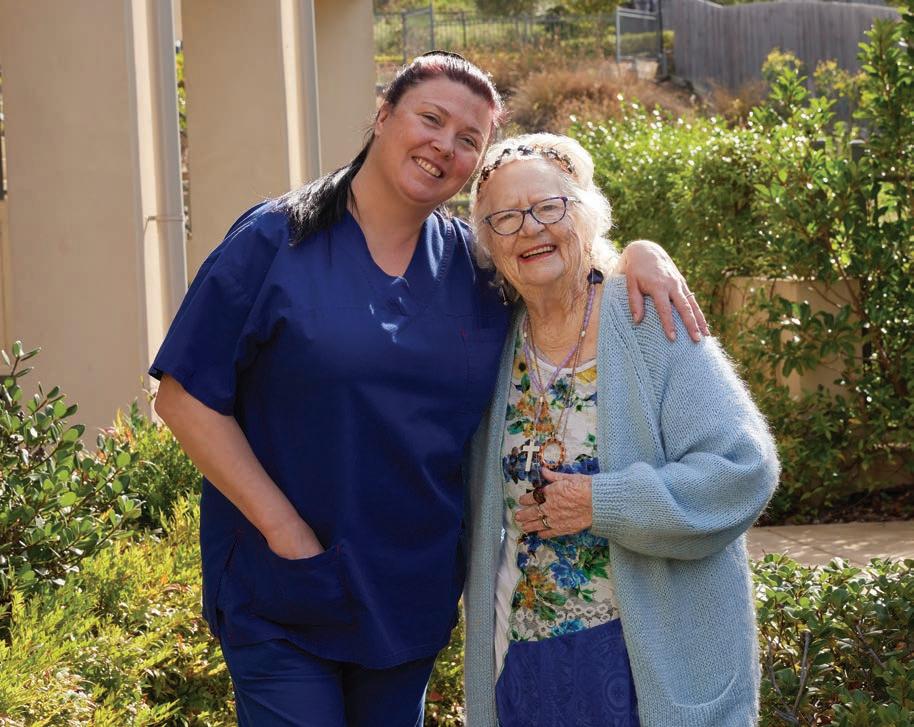
Ageing is living
At Opal HealthCare, we provide high quality residential care for older people. We believe care should be: Respectful of your privacy and dignity.
Deeply personal and tailored to you.
Holistic in approach and caring for your well being.
Supporting you to enjoy what you love.
Centred within a warm environment that builds and nourishes connections with your loved ones.
Talk with us to find out more. Scan the QR code, call 1300 437 527 or visit opalhealthcare.com.au

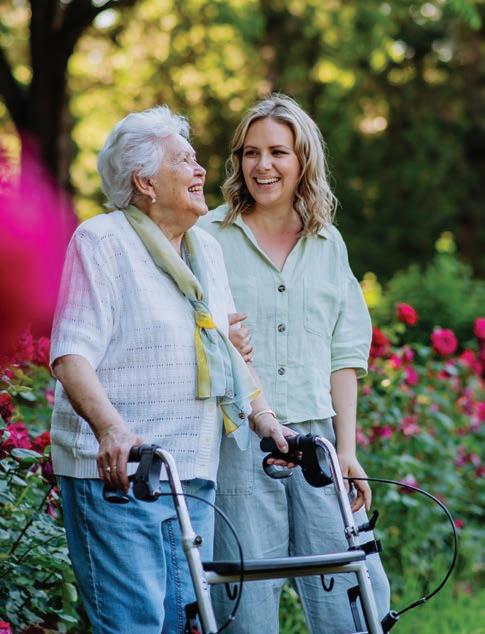









 Founding Director Pauline Healy
Founding Director Pauline Healy
















